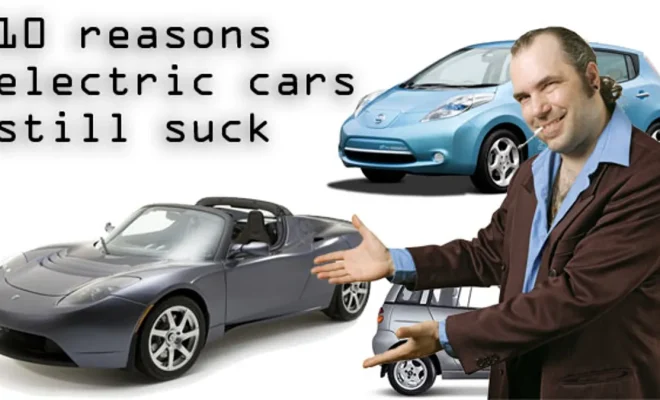Ten reasons electric cars still suck: We unplug the EV hype

Electric vehicles (EVs) have been gaining popularity worldwide, with many people touting the benefits of green technology and reduced emissions. However, there are still several reasons why electric cars may not yet be the perfect automotive solution. In this article, we will discuss ten reasons why electric cars still have some issues that need addressing.
1. Limited Range: One of the most significant drawbacks of electric cars is their limited driving range compared to gasoline-powered vehicles. Many models struggle to reach 300 miles on a single charge, tying drivers down to an extensive recharging network and limiting spontaneous road trip opportunities.
2. Long Recharging Time: Refueling a gasoline-powered vehicle takes only a few minutes, while recharging an electric car can take hours. This inconvenience becomes especially prominent on long trips, where multiple charging stops add up to a considerable amount of lost travel time.
3. Charging Infrastructure: While the number of EV charging stations is steadily growing, it is still far from being as conveniently available as gasoline stations. In rural areas and some countries, charger accessibility can be scarce, leading to “range anxiety” for EV drivers.
4. High Initial Cost: Despite government incentives and lower operating costs in the long run, electric vehicles often come with a higher price tag than equivalent gasoline-powered models. This upfront investment can discourage many potential buyers from making the switch.
5. Battery Degradation: Over time, the batteries used in electric cars begin to degrade, leading to reduced range and performance. While some manufacturers offer warranties on their batteries, replacing them can still be an expensive and inconvenient ordeal.
6. Limited Model Choices: Even though more automakers are introducing electric car models, they still represent limited options in terms of body types and features compared to their conventional counterparts.
7. Cold Weather Performance: Electric vehicles generally struggle with reduced range and efficiency in cold weather conditions. This problem stems from the nature of lithium-ion batteries, which provide less energy in low temperatures and require more power for heating.
8. Disposal and Recycling of Batteries: As the number of electric vehicles on the road grows, so does the concern surrounding the disposal and recycling of their spent batteries. The environmental impact of battery waste and the cost of recycling need to be addressed as electric vehicles continue to become more prevalent.
9. Insufficient Power Grid: As more people start to charge their electric vehicles daily, the additional load on already strained power grids may pose further problems. The role of renewable energy in allying with electric cars is crucial, but compatibility with power grids still needs extensive development.
10. Indirect Emissions: While electric vehicles produce zero emissions from their tailpipes, they are not entirely “green.” Power plants used for generating electricity may still contribute to greenhouse gases based on their resources. A full understanding of each vehicle’s overall environmental footprint requires a comprehensive assessment beyond just emissions.
In conclusion, while electric cars offer a promising alternative to traditional gas-powered vehicles, there are still several issues that need to be addressed before they become a viable option for all drivers. Continued technological advancements and infrastructure improvements may eventually help overcome these obstacles, but until then, it is essential to keep the “EV hype” in check and recognize that these green alternatives are far from perfect.






